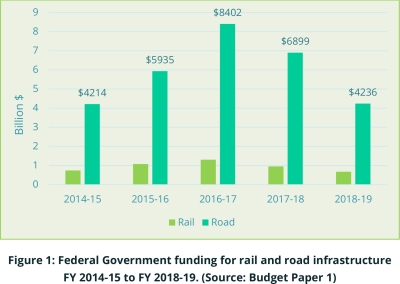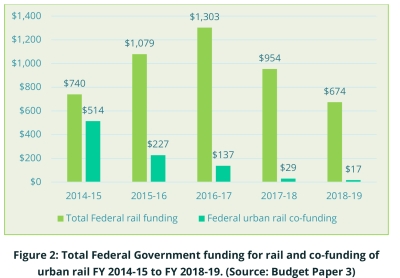
The Australasian Railway Association (ARA) has expressed disappointment in the Federal Government’s 2015-16 Budget, which announced the lion’s share of transport infrastructure funding to go toward roads, and no new money for the important rail infrastructure needs of the country’s biggest cities.
Interim chairman Bob Herbert AM said rail was swiftly approaching a funding cliff that would see key integrated rail infrastructure projects fall off the policy agendas of our biggest and fastest growing cities.
“Federal contributions to state government rail projects have effectively halved between this budget and the last, making up less than 5 per cent of the $8.6 billion infrastructure spending in 2015-16,” said Mr Herbert.
“This situation will not improve over the forward estimates without sustained future co-investment in urban rail, with Federal funding of urban rail projects going over the cliff from $514 million in 2014-15 to only $17 million in 2018-19.
“Australia as a nation is facing increasingly serious economic, social and environmental problems with traffic congestion clogging our roads, transport emissions choking our urban environment, fluctuating fuel prices and the continued growth of our major cities.
“The Federal Government’s continued approach of prioritising roads over rail will not address the long term transport needs of our growing cities,” he said.
Prime Minister Abbott’s commitments to roads were made clear in this Budget with around two-thirds of the $8.6 billion in Federal Government transport infrastructure spend going on roads, compared to just one-eighth being spent on rail.
Mr Herbert expressed further disappointment in the fact some of the money helping to build new road infrastructure was in fact coming from rail.
“We are seeing money earmarked for rail projects, such as the $187.5 million savings from the successful delivery of Regional Rail Link, being allocated to improving highway infrastructure that directly competes with Victoria’s regional rail system,” continued Mr Herbert.
“Decisions such as these are disincentives for the rail industry and its constructors and suppliers to work efficiently and effectively.
“Inland Rail was also a key priority for the industry, as outlined in our Key Platforms manifesto released prior to the Budget.

“The Federal Government has also re-committed $300 million of existing funds for pre-construction works on the Inland Rail. We are hoping for a stronger, clearer and more significant long-term funding commitment to Inland Rail from the 2016/17 Budget.
“The ARA is determined to pursue its priorities through working with both Federal and State Governments to ensure the nation and its cities receive the rail infrastructure needed for the future,” Mr Herbert concluded.
No business case for privatising Australian Rail Track Corporation (ARTC): union
The privatisation of the Australian Rail Track Corporation (ARTC) is a backward step that will see an important part of national infrastructure that pulls in $760 million in revenue sold off to the private sector.
Bob Nanva, national secretary of the Rail, Tram and Bus Union (RTBU), said privatising ARTC did not make economic sense.
“The Federal Government has spent over three billion dollars upgrading the ARTC network, but it is unlikely to recoup this investing in a trade sale.
“Instead, it will be handing over a money-making enterprise to the private sector, and leaving the future of our freight rail network, and every industry that relies on access to rail transport – in the hands of a private company.”
Mr Nanva said the freight rail network was a critical lifeline for regional communities around the country.
“We’ve know from experience in Western Australia, Victoria and Tasmania that the privatisation of rail freight networks can be disastrous for regional communities.
“You simply cannot rely on a private operator to invest for the future and to support regional jobs.
“In fact, experience shows that the first thing private operators do is slash and burn to cut costs and sweat the asset.
“That will mean jobs being lost, and more freight being moved by road rather than rail.
“National Party MPs will be extremely nervous about this announcement and the likely backlash from rural and regional communities.”
Mr Nanva said the planned inland rail project from Melbourne to Brisbane would be a game changer for rail freight, and would bring enormous opportunities for ARTC – if it was done properly.
“Forecasters expect the amount of freight carried on the Australian transport network to double over the next 15 years.
“Instead of selling off vital rail assets, the Federal Government should be investing in a stronger, more efficient and more reliable rail freight network that can take a larger share of the national freight task.
“The Rail, Tram and Bus Union will be campaigning against the sale of ARTC, and fighting to save jobs in regional and rural Australia.”





